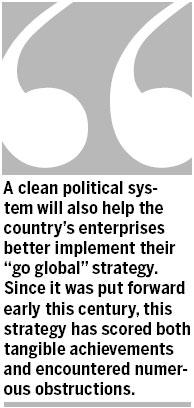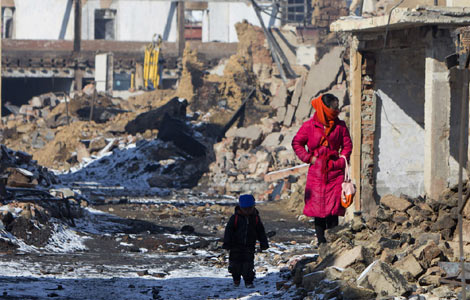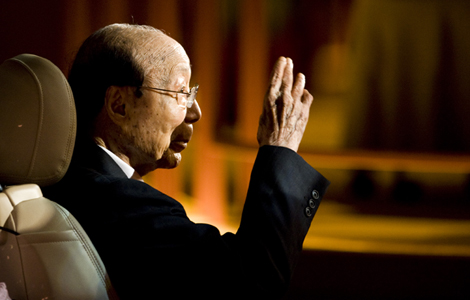Cleaner political environment
Updated: 2014-01-20 07:23
By Li Yueping (China Daily)
|
|||||||||||
Anti-corruption campaign can attract foreign capital and technology and help domestic enterprises go overseas
China has scored eye-catching achievements in absorbing foreign capital over the past decades and it is now one of the largest foreign capital recipients in the world. However, improvements are yet to be made to expand the country's space for the inflow of foreign capital, so as to raise the quality and make the inflow sustainable. Looking at other countries shows the inflow of foreign capital is closely related to how clean a country is. The cleaner the political system, the more foreign investment a country will absorb. The more corrupt the political system, the less foreign investment a country receives.
According to the corruption lists published by some international organizations, China's corruption is ranked at an intermediary level. Although China is not one of the most corrupt countries in the world, there is still a gap between it and those countries at the top of the rankings. This has to some extent compromised the country's attractiveness to foreign capital. Signs have emerged that China lacks the potential to attract long-term foreign capital, with most of the inbound capital short and middle term that can exit at any time.

Another notable feature is that a large proportion of China's inbound foreign capital is concentrated in labor-intensive areas, only a small proportion has flowed to capital and technology-intensive sectors. Numerous factors have contributed to this, but corruption remains one of major factors. Therefore, the substantial advancement of the anti-corruption campaign will help the country create better conditions to attract foreign capital.
But China should not just target its opening-up at just attracting overseas capital, it should also aim to learn and introduce advanced technologies and management expertise through opening-up. Whether overseas enterprises will transfer their technologies and management methods to China and whether these technologies and management know-how can be smoothly absorbed, will, to a certain degree, be decided by whether a clean political system can be established. Only after China establishes a set of basic political institutions that can run parallel to other countries and only after it puts in place economic rules that extend to the market a decisive role in economic activities, will overseas enterprises transfer their advanced technologies and management expertise.
A clean political system will also help the country's enterprises better implement their "go global" strategy. Since it was put forward early this century, this strategy has scored both tangible achievements and encountered numerous obstructions. Many domestic enterprises have encountered fierce resistance to their attempts to make overseas acquisitions, and some overseas economic activities by Chinese enterprises have received harsh criticism although they have contributed a lot to local economic development. Some have even implicated themselves in local conflicts, damaging China's national image. There are numerous reasons for these problems, but the different economic environments Chinese enterprises face at home and abroad remains a major one. With their development and buildup in a non-transparent domestic operating environment, Chinese enterprises usually develop a stereotype mentality for commercial operations, which makes it difficult for them to adapt to the more transparent international environment. Applying the same methods that proved viable at home puts Chinese enterprises in a disadvantageous position and exacerbates concerns about their purposes. Such concerns negatively affect the large-scale and high-level investment activities by Chinese enterprises in foreign countries. To change this, Chinese enterprises going overseas should receive more training and guidance on international rules. More importantly, more efforts should be made to improve the country's domestic economic operating environment and increase its transparency, fairness and cleanness. This will fundamentally change the impression of China's operating environment overseas, and change image and reputation of Chinese enterprises in the international community. All these are inseparable from the advancement of the country's anti-corruption drive.
China should not just try to push its enterprises and its economic activities to go overseas, it should also think about how to bring its culture and values in line with foreign practices. Without reducing or eradicating domestic corruption, the persuasiveness and attractiveness of its cultures and values will be seriously affected in the international community and will meet difficulties gaining approval from other countries. A forcible anti-corruption drive can help China promote its culture and values to international audiences.
Only after all of our officials discard a selfish perspective and hold an open and tolerant approach toward departmental and regional interests, can our reform and opening-up cause make stride forward.
The article was originally published in Chinese in Study Times.
(China Daily 01/20/2014 page8)
Related Stories
Senior general tangled in corruption, magazine says 2014-01-17 07:17
Eradicate corruption at its root 2014-01-16 20:07
Village leaders plead guilty in corruption case 2014-01-16 10:29
Beijing sets sights on park venues in corruption drive 2014-01-16 07:08
Corrupt officials beware this New Year 2014-01-16 00:42
Today's Top News
Xi writes to Chinese in German colleges
China software to rival Android
Will China dominate the world?
Mainland policy lures HK students
Obama tells Germans he will not wiretap
Party is over for SOEs conferences
Egypt referendum wins support
Home prices continue to climb
Hot Topics
Lunar probe , China growth forecasts, Emission rules get tougher, China seen through 'colored lens', International board,
Editor's Picks

|

|

|

|

|

|





